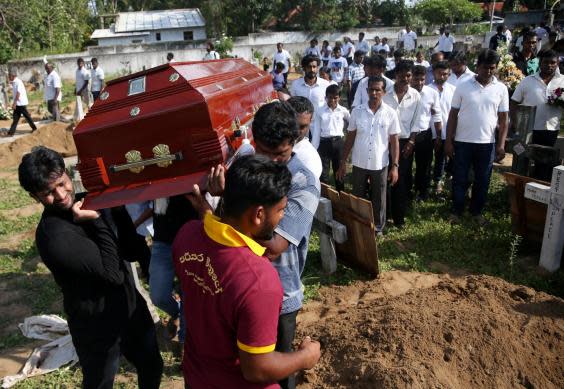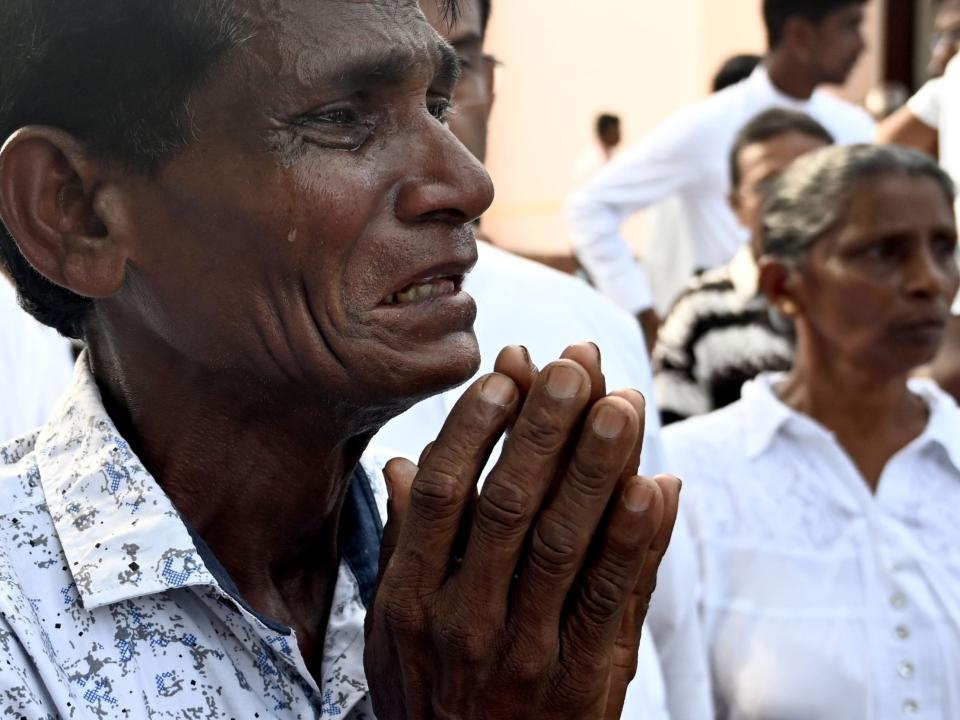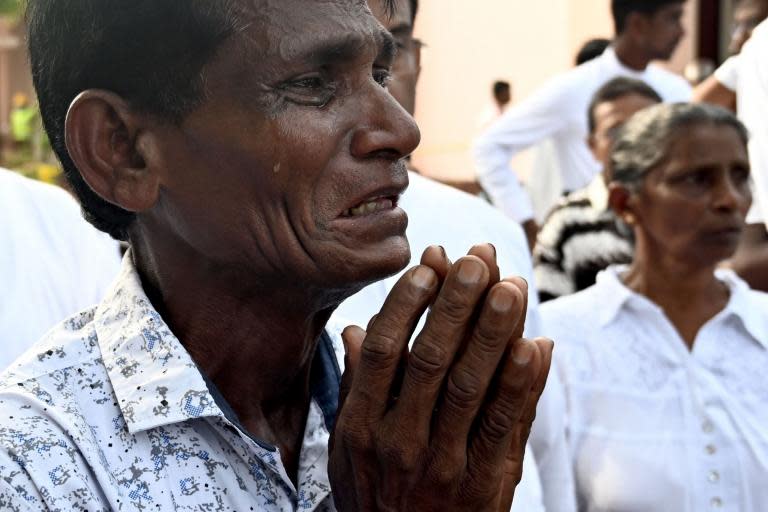‘The first thing I remember seeing was limbs’: Sri Lankans recall the moment Negombo church was hit
The smell of stale blood still lingers in the grounds of St Sebastian’s Church in Negombo, western Sri Lanka, where on Tuesday the first mass funeral service was held for some of the more than 320 people killed in the Easter Sunday bombings.
While forensics teams still work inside the church and blood-splattered pews are stacked up to one side of the nave, a community in mourning gathers under a hastily erected canvas tent where Cardinal Malcolm Ranjith, the archbishop of Colombo, leads the service.
Thousands have come to pay their respects or see the burial of their loved ones, thronging these normally quiet back streets in a procession leading from the service to a large cemetery which, acquired only recently, the church had scarce thought they would need to fill so soon.
Each home along the route to the cemetery has put out a white flag – the colour of mourning in Sri Lanka. Occasionally a house displays a bright, colour photograph with dates and a short tribute, identifying occupants killed in the attack. Most of the pictures are of women, sometimes several from a single home.
The first 22 coffins are packed close together in one corner of a vast hole dug using heavy-duty machinery in the sandy earth. While the process of accounting for the dead continues, church leaders believe more than 200 people may have been killed in just this one bombing, making it possibly the deadliest of Sunday’s six coordinated attacks.
Simple, wooden crosses stand at the head of each makeshift grave, some of which are so short they can only belong to very small children. All bear just a number – there has been no time to give them their full names or proper gravestones. That will all come later.
Father Niroshan Perera, the priest presiding over the burials, is asked to do so because he was born and grew up in the village behind St Sebastian’s from which many of the dead also haled. Each mound of earth is a source of personal pain, he says.
“Here in Sri Lanka we live as human beings very close to each other, and in our village in particular we are a very close-knit community. We share everything together; our feasts, our goodness and our sadness. This really hurts all of us, it is a very hard time for everyone.”
As the Sri Lankan government admits it failed to act on warnings of an impending attack by local jihadis with international links, and the Isis militant group claim the suicide bombers as its “fighters”, here in Negombo there is only deep sadness and exasperation that a Catholic community with no history of involvement in communal violence has been so devastatingly targeted.
Laxman Perera, a 55-year-old carpenter who works at St Sebastian’s and was stood near the entrance to the church at the time of the attack, told The Independent he saw the bomber, a man in his late twenties, walk in wearing a large, heavy black backpack as the Easter Sunday mass ended.
“People say that when he was arriving he stroked children’s heads, held one child’s hands, and walked in very peacefully,” Mr Perera recalls. “As soon as he reached the entrance he sped up, he almost ran down the aisle. When he reached the very middle of the church, I saw him grab the straps of the backpack and hitch it up. There was a huge explosion, a bright flash of light. The tiles of the roof immediately caved in, then I blacked out.”

Mr Perera estimates there are around 500 people sat in the part of the church where the bomb went off, in addition to more than 1,000 stood outside in the grounds. “When I woke up, the first thing I remember seeing was limbs,” he says. “More than the blood, it was just pieces of people, strewn all over. These were little children who came in holding their mothers’ hands, and then they were gone in a split second. I am finding it very hard to comprehend. I am sad and angry and hurt, all at the same time. It was not a man who did this, he couldn’t have been a man. It is like the stories our mothers told us to keep us afraid, it was like the devil incarnate had appeared.”
I am sad and angry and hurt, all at the same time. It was not a man who did this, he couldn’t have been a man
Laxman Perera
It feels like everyone in Negombo has a story to tell of someone caught up in the attack. Irinita Sarang, 32, says her mother, father and two younger siblings were inside the church on Sunday but left just before the end of the service because the youngest of the children wasn’t feeling well. “Seconds after they walked out, the explosion went off behind them. It was so close, my father has gone deaf from the impact. They don’t remember seeing anyone with a device – they don’t remember much at all. They are in shock. We are all in shock.”
Father B A Shiran, the rector of St Nicholas’ International College in Negombo, says members of two families from the school had been killed in the blast. One of Father Shiran’s pupils, a 12-year-old boy, was now an orphan after losing both his mother and father, as well as his grandmother, in the explosion. For now, the boy was being cared for by his uncle, Father Shiran says. “This is such a tragic event, we are all absolutely devastated,” he says.
“We have to be calm in this situation because emotions are very high for everyone involved at the moment, but this attack has angered the whole country – and that was probably the intention. But I would say to the Muslim community around the world that they must do more to rise up against this extremism. That is what we expect of them now.”

On the road back to the capital Colombo, traffic slows as it passes another huge funeral procession. There are multiple hearses carrying coffins, as well as drummers and rickshaws bearing images of those killed – and a heavily armed police escort.
I would say to the Muslim community around the world that they must do more to rise up against this extremism. That is what we expect of them now
Father Shiran
For while the mourners march into the city, news emerges that police believe vans and lorries entered Colombo armed with more explosives, ready to target large gatherings. At a news conference, Sri Lanka’s prime minister warns there are still more explosives and militants “out there”.
With many more funerals to come and a death toll that is likely to once again rise, such scenes of sadness and fear will be repeated again and again before Sri Lanka can move on from this tragic series of events.

 Yahoo News
Yahoo News 

